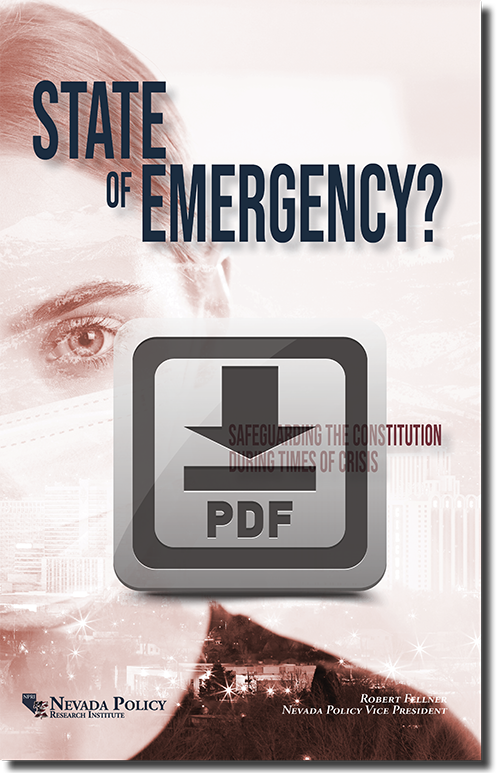
Mayor Goodman is right: the Sisolak Shutdown must end
In a statement issued last week, Las Vegas Mayor Carolyn Goodman once again called for an end to Governor Sisolak’s indefinite “state of emergency” and a repeal of the various restrictions and mandates associated with it.
The Mayor correctly notes that permitting the Governor to act as a super-legislator for a second year is fundamentally incompatible with our system of constitutional, representative government.
Mayor Goodman also objected to lockdowns on practical grounds, noting their utter failure when measured from a public health perspective. This is likely to come as a surprise to some, given the media’s consistently slanted treatment of the efficacy of lockdowns, but it is indisputably true.
Those in favor of lockdowns tend to focus only on whether and to what extent they correlate with a reduction in COVID cases, while paying little attention to the harm they cause: Increased suicides, drug overdoses, and deaths stemming from delaying cancer screenings and other necessary medical care. The damage from lockdowns also includes increased mental health issues, economic devastation, and learning loss for public school students.
A new study found that the rate of hospital visits for mental health conditions, suicide attempts, drug and opioid overdoses, intimate partner violence, and child abuse and neglect were all higher during the COVID-19 pandemic than the same period in 2019.
Another study found that, in just the first month after most states closed their schools, the number of reported mental health issues and acts of intentional self-harm in children aged 13-18 increased nearly 100%.
Closer to home, it was the horrifying “surge of student suicides” that forced the Clark County School District to finally reopen, according to a New York Times report.
Given the widescale death and destruction caused by lockdowns, the question isn’t whether they can reduce COVID transmission at all, but whether they provide benefits that outweigh their extraordinary costs. Mayor Goodman appropriately observed that there is no evidence whatsoever that justifies aggressive lockdowns.
One way Mayor Goodman made this point was by citing Florida, which embraced personal freedom and responsibility while enjoying similar or better COVID results than many pro-lockdown states. Were the lockdowns apologists correct, Florida would have a far higher COVID fatality rate than every comparable state that embraced lockdowns. Instead, Florida’s COVID numbers are better than most.
Rather than reflecting on the implications of this fact, the Review-Journal instead sought to discredit Goodman by countering with the following:
But stay-at-home orders with public mask mandates, case investigations and contact tracing are effective in reducing cases, hospitalizations and deaths, according to a CDC study.
That is not an effective rejoinder to Mayor Goodman’s claim for several reasons.
First, the reduction found in the referenced CDC study was limited to the state of Delaware from April-June 2020. The pandemic, however, did not end in June and Delaware’s COVID numbers have exploded since then, much like the rest of the country.
Second, the Delaware study says nothing about lockdowns on their own, which is what Mayor Goodman is criticizing. Contact tracing is unquestionably effective and in no way comparable to lockdown measures like stay-at-home orders or forced business and school closures. As the study authors admit, they merely looked at what happened after a lockdown, mask mandate and a contact-tracing program were all implemented, then assumed whatever happened afterward was the result of all three. This tells us nothing — literally nothing — about the relative benefits of harsh lockdowns.
Third, a study that examined 160 countries over eight months while looking exclusively at lockdown stringency — rather than just looking at Delaware for two months — found that the “stringency of the [lockdown] measures…did not appear to be linked with [the COVID] death rate.”
Another study published by the European Journal of Clinical Investigation examined the effect of lockdowns, specifically mandatory stay-at-home orders and forced business closures, and found that they had “no clear, significant beneficial effect on case growth in any country.”
At least 29 other studies reached similar conclusions.
Mayor Goodman’s point was correct: There is little to no evidence that harsh lockdowns are better at controlling COVID than a more measured approach. The overwhelming harm caused by lockdowns, however, is undeniable. Thus, lockdowns caused tremendous damage while offering negligible benefits against COVID.
Faced with this uncomfortable fact, lockdown advocates are left citing poorly designed studies to support the increasingly untenable claim that lockdowns were sound policy. The more rigorous studies finding no benefit from harsh lockdowns are ignored, as is the most important question that should have been dominating the discussion since the beginning: “But, at what cost?”
Ending the lockdowns and Sisolak’s so-called state of emergency not only protects our fundamental liberties and constitutional system of government, but is also the soundest policy when measured from a public health perspective.
Year 2 of “Emergency”
In addition to presenting a highly slanted view of the science regarding the efficacy of lockdowns, many journalists have also failed the public through their uncritical acceptance, if not outright endorsement, of governors acting as super-legislators for an indefinite period of time.
Mayor Goodman is in good company when noting that Sisolak’s never-ending state of emergency “smacks of tyranny.” As Enlightenment philosopher Montesquieu warned many years ago: “When the legislative and executive powers are united in the same person, there can be no liberty.”
Yet, the concerns over Sisolak’s unprecedented actions that have allowed him to consolidate and wield both the legislative and executive powers for more than 365 days, with no end in sight, were summarily dismissed by the Review-Journal, which claimed that “his authority to do so is found in state law.” The only support provided for that claim, however, was an interview conducted with a constitutional law scholar in March of 2020.
The expert opined that the 30-day business closure implemented at that time was constitutional. And it probably was. Mass deaths resulting from an overwhelmed hospital system would meet the criteria of a legitimate emergency. And that was the scenario we were sold 365 days ago. But that is not the scenario today. Even the lockdown advocates never dared to try and justify the current situation, where lockdowns and an unchecked executive would continue until the virus disappears entirely. Hence, the slogan was “slow the spread,” not “eliminate the spread.”
A second year of “emergency” actions related to slowing the spread of an infectious disease is fundamentally unconstitutional. Obviously, Governor Sisolak will claim that his actions are authorized by state law. Journalists, however, should be concerned with determining whether that claim is valid.
A close reading of the statute and its legislative history, as well as recent court rulings, make clear that Governor Sisolak’s ongoing edicts are devoid of legal authority. The Emergency Powers Act applies only to events that require immediate action to save lives, such as natural catastrophes, missile attacks from foreign adversaries, and so forth.
Rather than rubber-stamping the Governor’s self-serving claims, Nevadans would be better served by journalists that tried to answer the following question: With hospitals empty, vaccines flowing and cases falling, does the Nevada Constitution permit Sisolak to act as a super-legislator for a 2nd year?
Mayor Goodman deserves credit for saying the obvious: No, it absolutely does not.
